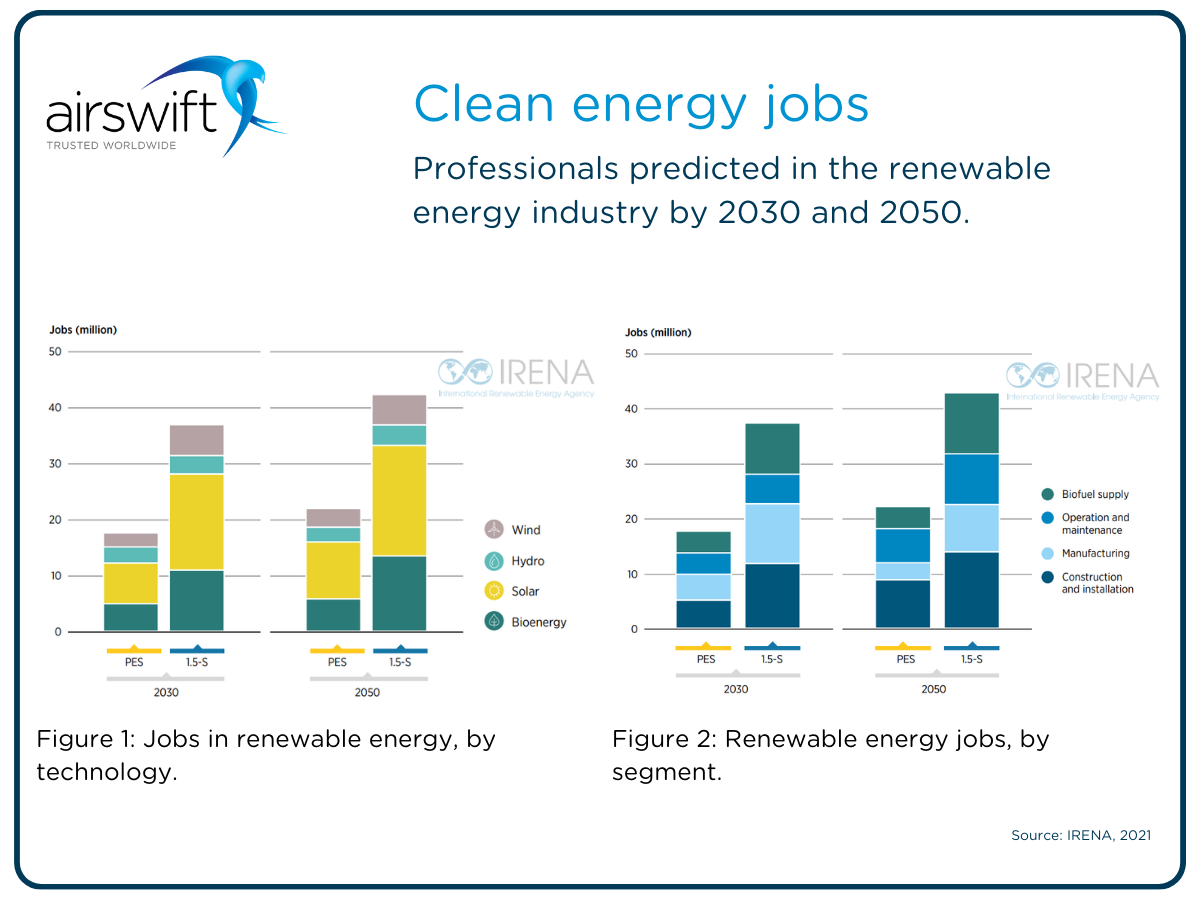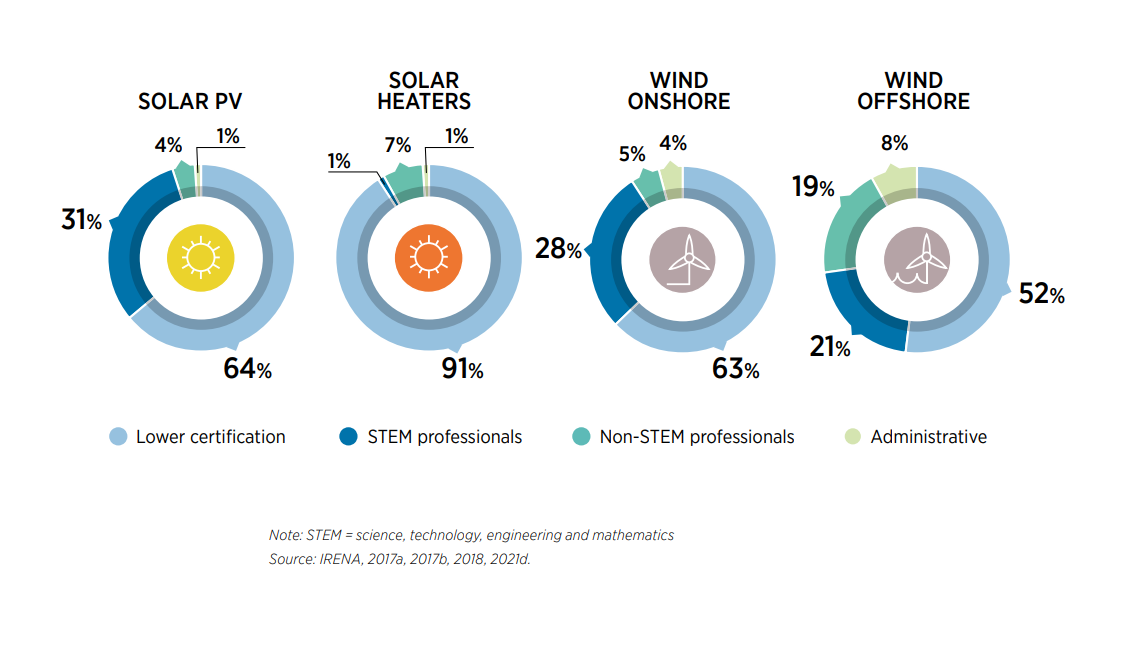Want to transition from Oil & Gas to Clean Energy? Here's how
February 14, 2022
- Home
- Blog

Source: Fit Ztudio/Shutterstock
More than 1 million jobs have been lost worldwide in the Oil & Gas industry in recent years. The sector has experienced a complex challenge in the face of the COVID-19 pandemic along with added pressure from society to the energy transition.
So, how can we mitigate the impact on these workers and reduce carbon emissions? The answer lies within the renewable energy industry, which is on the rise and will have the highest rate of job growth.
Fossil fuels have dominated the 20th century, but the consensus is that cleantech will power the 21st century. According to the Renewable Energy and Jobs Annual Review 2021, from IRENA, about 12 million people were employed in the sector, directly and indirectly, in 2020. By 2050, it is predicted that the industry will create up to 43 million new jobs.

Figure 1: Jobs in renewable energy by 2030 and 2050. Source: International Renewable Energy Agency (IRENA), 2021.
Transferable skills between the industries
Although there are strong predictions for employment in clean energy, there is still a lack of experienced field technicians and engineers.
Oil & Gas professionals are a vital talent resource in the renewable energy industry due to their many transferable skills. Especially in areas such as project management, engineering, construction, finance, and operations.
Find out about the skills in demand, knowledge, and experience that will make you a suitable candidate for a transition from Oil & Gas to green energy.
Offshore/Floating
Professionals with civil engineering backgrounds and Oil & Gas experience with offshore structures are highly in demand for wind energy projects. This is because wind farms use similar technology and processes.
Safety
Although each sector has specific standards and additional training, health and safety skills are highly required and transferable between industries.
High voltage
Knowledge of high voltage electrical equipment is critical in both sectors.
Leadership and management
Qualifications and experience across leadership and management are relevant skills that can differentiate you from other candidates.
IT
Professionals with experience in IT are highly in demand within the cleantech sector as the industry continues to grow and evolve.
Jobs in demand
The list below includes some of the most in-demand jobs that are transferable from the Oil & Gas industry to renewables.
Main roles:
- Project Management
- Supply Chain Management
- Civil Engineering
- Geotechnical Engineering
- Surveying
- Marine Engineering
- Foundation Package Managers
- Fabrication Managers / Superintendents
- Client Site Representatives
- Offshore Construction Specialists
- Offshore HSE Reps
- HSE Site Reps
- QA/QC Professionals – Welding, NDT, Coating
- Installation Managers
- Cable Installation Engineer and Site Representatives
- Subsea Engineers
- Environmental Surveyors
Occupational patterns and skill levels
Renewable energy employs people across all trades and levels. IRENA analyses the human resource requirements for the solar PV, solar heaters, onshore and offshore wind industries.

Figure 2: Human resource requirements for workers in solar PV, wind energy (onshore and offshore), and solar water heaters. Source: IRENA, 2021.
Human capital: major companies competing for green skills
The biggest challenge today is human capital. Utilities, renewable energy groups, and Oil & Gas companies that have set out strategies to achieve net-zero emissions are competing for green skills that are in short supply.
Ronan Cassidy, Shell's Chief Human Resources and Corporate officer, said:
This is a competitive and dynamic market, and to attract the best talent, a competitive package alone is not enough; you need to have a credible and meaningful strategy and show how people can make a difference.
5 tips to be successful in your renewable energy job search
Nana Terra, Airswift Content Marketing Coordinator, discusses the primary transferable skills and gives 5 tips to succeed in your clean energy job search.

Training
Keep your eyes open for training opportunities. The Association of Energy Engineers offers over 20 different certifications, including the Renewable Energy Professional certification and the Certified Energy Manager certification. Also, some renewables companies provide training to professionals who have qualifications in Oil & Gas.

Add keywords in your CV
Research the equivalent terms across each industry and maximize impact by including relevant keywords tied to the job requirements to make your CV more likely to appear in recruiters' searches. Some companies use an applicant tracking system (ATS) to collect, scan, sort and rank candidates. So, including keywords in your resume is vital to increase your chances of getting an interview.
Highlight transferable skills
Make sure you reference essential qualifications or experience across leadership, health and safety or management in your CV, as they are transferable skills. Also, clearly communicate and be honest about your reasons for switching to renewables, focusing more on the positive factors.

Soft skills
Beyond the transferable technical skills, it's also essential to identify the soft skills that will help you make a smooth and successful transition to the new role. Candidates with adaptability, excellent communication and interpersonal skills, and teamwork ability can be valued by employers.

Keep in the loop
Keep up to date with the latest news from the sector to see where upcoming renewable projects are going to be located.
Want more insight into talent trends in the renewable energy industry? Click the link below to download our latest whitepaper.
How Airswift can help you in your green energy job search
The industry is changing fast. But with over 60 offices worldwide, 1,000 employees, and more than 9,000 contractors, Airswift has supported energy companies for 40 years.
Our team works with key companies in the renewables sector, consulting with clients, hiring managers, and candidates in this space. So, if you are looking for your next role in the clean energy industry, speak to Airswift.
We have worked with many STEM professionals from other sectors, looking to become an integral part of the energy transition. We look forward to working with you and your career in green energies.

This post was written by: Nana Terra, Content Marketing Coordinator
You may also be interested in…
-
How can offshore wind benefit from transferable skills within oil and gas?
-
What skills can empower the workforce of the future?
-
Will offshore wind power the energy transition in the Netherlands?
-
How can power firms improve their environmental image problem?
-
Best practices for energy companies to transition to a remote workforce
-
Transitioning into the battery industry
-
5 wind farms to watch in Norway, the green battery of Europe
-
Navigating the energy sector: Insights from the 2024 GETI report
-
Building a better grid: The role of tech talent in power reliability
-
Are we on the right track to achieving net zero? 6 highlights from COP27





